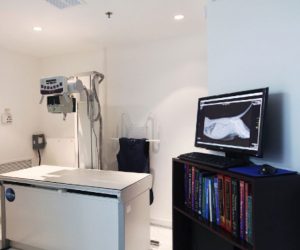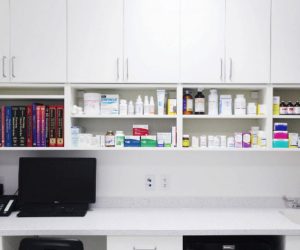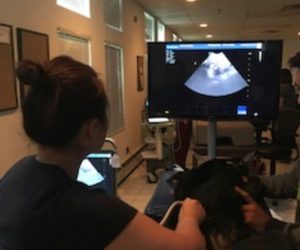We have an onsite laboratory
with qualified tech personnel to perform in-house testing as needed
Lab / Medical Equipments (Lab Ultrasound)
Laboratory Testing
Our in-house laboratory facilities provide blood chemistry, blood counts, urinalysis, serology tests, parasite tests and cytology tests available for diagnosis. We get immediate results for pets who need urgent care. Pre-anesthetic blood work is encouraged and can be performed on the same day as surgery or dentistry. We also use a nationally recognized veterinary laboratory for more specific tests. Our Red Roof veterinarians are available to discuss results with you.
Advanced Medical Imaging/ Digital X-Ray
We have a state-of-the-art digital X-ray machine available that can diagnose your pets during emergencies and injuries, and detect any early diseases. Our computerized system gives us quick results and lets us electronically transmit images to radiologists for consultations.
Ultrasound
Ultrasound is a non-invasive and non-painful way to view any organs in a dog or cat. An ultrasound can diagnose a wide range of medical conditions (stones within bladder, kidneys or gallbladder, abnormalities in the abdomen, lymph nodes, blood vessels, uterus, heart, etc.). It can also detect congenital conditions in young and healthy pets.
Digital Dental X-Ray
Digital dental x-rays are a way to see the internal anatomy under the gum line and detect any hidden conditions, that would not be noticed just from a dental cleaning alone. The stage of periodontal disease can be determined by the x-ray showing bone loss around the tooth roots.
Advanced Cardiac Work-up / Echocardiogram
We are able to determine the heart condition of your pet by providing extended services and tests such as EKG, blood pressure, echocardiograms. Echocardiography is the best test to diagnose heart disease because the ultrasound waves give real-time images to evaluate the heart. We do EKG to determine whether the pet’s heart rhythm is normal and use chest-X rays to look for fluid accumulation in lung fields (e.g. congenital heart failure). We also have a PetMap blood pressure device to check accurate blood pressure.
Comprehensive Eye Exam
Pet’s eyes are prone to problems such as infections, injuries, glaucoma, cataracts, dry eye, tumors, corneal ulcers, blindness and many more. Our comprehensive eye exam/tests/services can detect these problems early. Some of these exams are tear tests, staining tests and eye pressure that’s checked by using the best quality tonometry machine.
Blood Testing
How do I prepare my pet for routine blood collection?
Things you can do to prepare your pet for a routine visit to the veterinarian include:
1. Gentle fasting: If possible, do not feed your pet for about 6 hours before your appointment. Fasting helps to clear the blood of lipemia, fat droplets that appear after eating. Lipemia can interfere with some blood tests and make the results difficult to interpret.
2. Keep water available: This is especially important in warm weather. Even mild dehydration may change the test results, so be sure your pet has access to water before your visit to the veterinarian.
3. Avoid exercise and active play just prior to your visit: Physical activity can cause changes in test results, so exercise and active play should be avoided.
4. Minimize stress: This may be difficult if your pet is nervous or frightened, but some suggestions include:
- Dogs: Keep your dog on a leash at all times. This makes it less likely your pet will be frightened or upset by other animals in the waiting room.
- Cats: Bring your cat in a cat carrier. This helps your pet feel more secure and eliminates the risk of escape.
- Handle your pet calmly and quietly – talking in a soothing voice may help to distract your pet and reduce anxiety.
- If the waiting room is crowded, you may wish to let your pet wait in the car (weather permitting) to reduce excitement.
- If your pet is highly excitable and the veterinarian is concerned this may affect blood test results, your appointment may be booked at a separate time when the clinic is quieter. This may reduce the stress associated with taking a blood sample.



